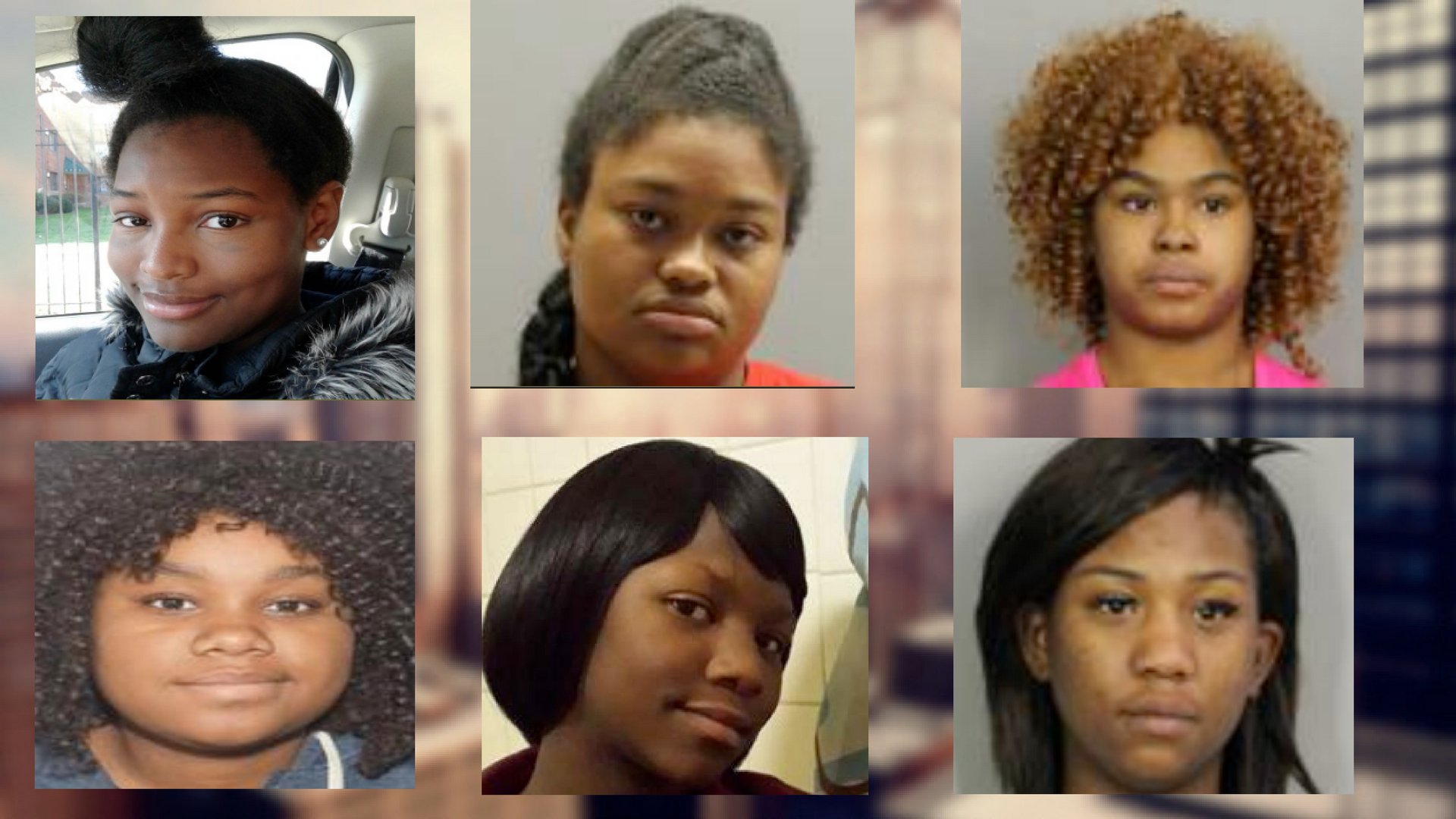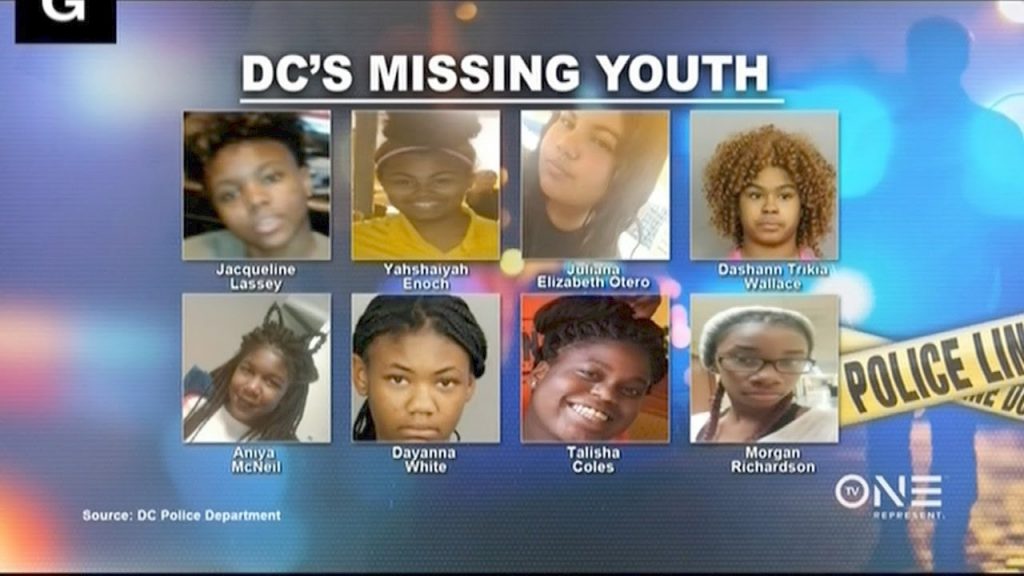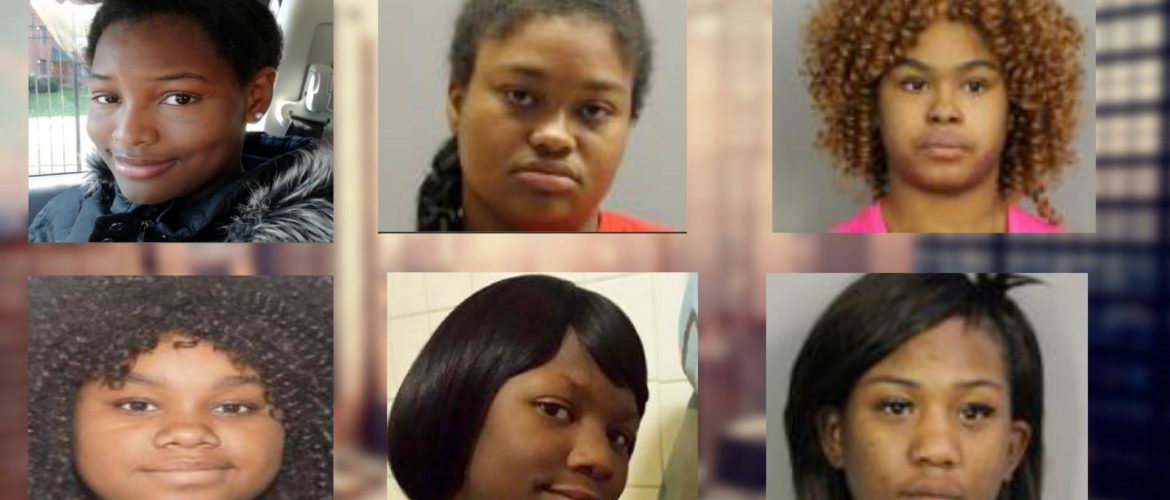Update: Dayanna White has been found & Vaneshia Weaver was never missing.

Police listed Weaver as missing since Feb. 16, 2017, last seen in Columbia Heights. But in an email sent to WUSA early Saturday, Weaver said she was stunned to see her picture on the local news, and maintained she never disappeared.
“I asked myself, ‘how is this happening? I’m not missing,” Weaver said in an interview at her Takoma home. “I was talking with my social worker through text, email, on the phone, every day.”
————————————————————————–
D.C. Mayor Muriel E. Bowser announced Friday that the city will create a series of new initiatives including a task force to assist in finding missing children and teens in the District.

The Washington Post reports that Bowser will increase the number of police officers assigned to find missing children and establish a task force to determine what social services teenagers who run away need. The city would also allocate more money to those organizations that work with vulnerable teens. The mayor says there are also plans to update a city website to include more information on each missing child.
Bowser said the goal is to ensure that the onus doesn’t fall entirely on the police department. “Often times, these girls are repeat runaways,” said Kevin Harris, a spokesman for the mayor. “So if we really want to help solve this problem and bring down the numbers, we have to break the cycle of young people, especially young girls, who repeatedly run away from home.”
Just like many of you, the fact that so many African-American and Latinx children are missing at such a high rate has me perplexed on why isn’t anything being done, so i looked into it. Apparently, the children, according to D.C. Mayor Muriel Bowser and the law, aren’t reported as missing, but runaways. The cops aren’t involved and have put out very few amber alerts, assuming they aren’t in massive danger.

Now, juveniles of all backgrounds/ethnicity are reported missing for a multitude of reasons, whether it’s because they didn’t check in at home, work or school for voluntary reasons, or more. The most concerning cases usually revolve around conflicts in the home. Unfortunately, Black and Latinx teens, on average, are more vulnerable to the type of abuse that provokes a teen to run away from home because they are more likely to live in high-risk environments.
The missing girls are classified as runaways, and not missing or abducted. The point of contact for the children if seen is the D.C. Youth and Family Services, not the D.C. police department. No Amber Alerts have been issued because the system was created to help recover abducted children, and the missing girls are of course classified as runaways. Now, some may be runaways, however; the rate at which these girls have gone missing and the lack of media coverage and support from D.C.’s law makers and enforcers is only increasing the problem, and in turn, showcasing another problem. It wasn’t until Black Twitter got a hold of the problem that many, including myself (and i live in Maryland), was even aware that there were so many missing children, and I’m only an hour away from D.C. To this day, I still haven’t seen the disappearances on local news outlets here.

(Dayana White, Pictured Above, Was Found Last Night, with majority of the help not from the police according to her mother.)
“Take the case of Relisha Rudd, an eight year old who went missing in D.C. in 2014. Her case was almost exclusively covered by The Washington Post, and a handful of local and black news outlets. Cable news did not loop the disappearance of Rudd like they did for the highly publicized cases of Natalee Holloway, Elizabeth Smart or Caylee Anthony.”
It takes 3.2 secs to retweet and help find these 8 BLACK GIRLS reported missing in Washington, D.C. during the past three days (1/2) pic.twitter.com/xpEwNcW44S
— Black Marvel Girl (@BlackMarvelGirl) March 13, 2017
It takes 3.2 secs to retweet and help find these 8 BLACK GIRLS reported missing in Washington, D.C. during the past three days (2/2) pic.twitter.com/kaP15Bk4Kk
— Black Marvel Girl (@BlackMarvelGirl) March 13, 2017
Last night, Wednesday March 22nd, 2017, a town hall-style meeting was held in Southeast D.C., hosted by Ward 8 Councilmember Trayon White where discussions took place revolving around the missing girls.
Mayor Bowser, Acting D.C. Police Chief Newsham and Commander Dickerson of the department’s Youth and Family Services Division told reporters there is no evidence that suggests those reported missing are related to human trafficking.
“The overwhelming majority of our missing persons quickly return home or are located. So far in 2017, 95 percent of our cases have been closed. In 2016, we had almost 1,000 fewer reports of missing persons than we had in 2012,” Newsham said.
Emotions ran high at tonight's meeting for the missing in D.C. The packed room was quiet when one young girl just asked "why?" pic.twitter.com/UhIccOtLow
— Van Applegate (@VBagate) March 23, 2017
“The difficult thing is some of these kids do go missing multiple times,” said Acting Police Chief Peter Newsham. “When they go missing, guess what? You have a child out there and there are people in our community that will prey on those children.”
Commander Dickerson told FOX 5 DC, “I don’t know what’s going on, but it is definitely a deeper issue.”
The statistics. according to D.C. police’s website, do not show a spike in missing person cases among juveniles when compared to previous years, and from the statics they give, they’re right. However, when the girls aren’t being reported as missing or abducted, but runaways, your statics are less than accurate, and let’s not forget that the year just started essentially, it’s only March.
2017: 501 (as of March 22)
2016: 2,242
2015: 2,433
2014: 2,222
2013: 2,067
2012: 2,610
Many believe this is more than a mere runaway situation, that these are cases of human trafficking, which has always been prevalent, but has been extremely rampant along the east coast this year alone.
A few weeks ago, D.C. police’s website only listed one missing person, the case of Rudd. Their website now been updated and there are at least 10 active missing cases involving girls 18 years old and under.
“One child missing is one too many,” said Derrica Wilson, president of the Black and Missing Foundation. “It is not so much about the numbers. It is about the ones that are missing, what we can do to get them safe.”
The constant concern that social media plays when it comes to the threat of human trafficking is extremely dangerous, but in order to help and conquer, you cannot cover up what is happening. The remaining children missing could possibly be runaways, but to classify them that way before knowing anything just to keep statics down, or keep the rate of alarm and suspicion low is wrong, especially when they don’t have a history of running away. Yet, it seems that the Black and Latinx children are majority classified as runaways, and runaways don’t get amber alerts, which is why many of us probably haven’t heard about these girls missing until social media.
So far in 2017, there have been 708 missing persons reports filed at Metropolitan Police Department, of which 674 have been closed, and 34 remain open.
Critical Missing: Dashann Trikia Wallace, 15, last seen 3/8/17 in 200 blk of I St, SE. Seen her? Call 202-727-9099. #MissingPerson pic.twitter.com/U4Hmts0w4C
— DC Police Department (@DCPoliceDept) March 9, 2017
“It is a blessing and it is a curse,” said Wilson. “We are utilizing this tool to get these faces out there to find the missing and they are using these tools to recruit.”
There are currently 64,000 missing women in America with one important thing in common, the color of their skin. Essence points to a 2010 report titled “Missing Children in National News Coverage,” which found that while black children accounted for 33.2% of missing children that year, the media exposure rate was an unimpressive 19.5%. While black men go missing at statistically higher rates, coverage of black female disappearances is particularly telling in light of the attention similar stories get when white women are involved. In 2015, it was also reported that 1.5 million black men were missing as well, yet very little media coverage. Why is it POC that go missing are not covered, yet acts of violence are? Both are sad and negative, but only one gets constant attention and coverage compared to white people… which is a different conversation to be had later.
So as the story continues to develop, I will continue to update this article.

Sustain the remarkable job !! Lovin’ it! http://www.onlineshopping.i.net.pk/author/latoyajol4/